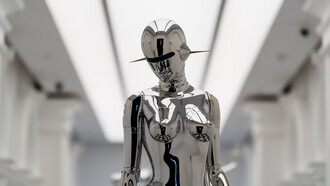Humans are creative and hungry creatures, desperately chasing after their ambitions but many seem to have forgotten that beyond their creativity, there is something much broader, the earth and the problem is this: as the people on this earth increase, there are economic and social issues that are arising at a rate that is unquestionable. From people’s egos to their nationalist values, the world is becoming a selfish and crowded place where vulnerable communities often get walked over by big countries or corporations and their political agendas.
However, these problems have been going on since the beginning of time. What before constituted as wars between kingdoms has now become manipulative tactics in business that show remorse for none. Yet, as an addition to this modern battle has come a technology that is bound to bring out a revolution in the world, Artificial Intelligence, with its analytical decision making, future predictions and ability to automate tasks, the benefits are clear but nevertheless, people are scared and rightfully so.
As stated by Mustafa Suleyman in a Time’s Magazine article1, “If the last great tech wave—computers and the internet—was about broadcasting information, this new wave is all about doing. We are facing a step change in what’s possible for individual people to do, and at a previously unthinkable pace. AI is becoming more powerful and radically cheaper by the month—what was computationally impossible, or would cost tens of millions of dollars a few years ago, is now widespread.”
The rising wave of AI is stirring anxiety among many professionals, particularly those who have invested years in building their successful careers and companies. They worry that AI’s widespread accessibility might undermine their hard-earned achievements and potentially replace their jobs, whether at high executive levels or lower ranks. However, as Chris Dede and David McCool point out in their Harvard News feature2, “it’s essential to recognize that this contrast between AI and humans is nothing to fear. Instead, it shows us why ‘human + AI’ is an ideal work partnership. AI can perform massive calculations in the blink of an eye at a pace far superior to even the most intelligent human on the planet. When paired with a human capable of making quick decisions based on lived experience, judgment, and practical wisdom, it’s an immensely more powerful tool than it is on its own.”
Rather than fearing AI’s advancement—which is inevitable with tools like ChatGPT and educational apps like Duolingo becoming increasingly accessible—the modern world should focus more on integrating AI with ethical considerations. AI is fated to revolutionize our world, but it will do so under human guidance, at least until it reaches full maturity. It is crucial to address biases in AI systems and ensure they are developed and used responsibly until that stage. For AI developers and users alike, understanding and acting on feedback to improve AI systems will be key to fostering a positive and fair progression in this technological era.
While concerns about the potential downsides of AI are valid, its extensive benefits far outweigh its negative aspects. As demonstrated by various scholarly perspectives, AI holds the promise of contributing to a fairer world. For instance, To be fAIr or not to be: Using AI for the Good of Citizens3 shows how AI can improve social services through responsible, human-centered approaches like the fAIr LAC project. Elizabeth D. Gibbons, in Toward a More Equal World: The Human Rights Approach to Extending the Benefits of Artificial Intelligence,4 emphasizes the importance of a human rights framework to ensure that AI’s benefits are widely accessible and to mitigate risks of inequality. The article Persuasive Technology for Mental Health: One Step Closer to (Mental Health Care) Equality?5 by Kolenik and Gams further illustrates how AI can help address mental health disorders, enhancing accessibility and reducing inequalities in ensuring emotional well-being, which is often very costly for small communities to be able to afford.
Lastly, Monasterio Astobiza et al. in AI Ethics for Sustainable Development Goals6 detail how ethical AI design can drive progress towards the SDGs, promoting fairness, transparency, and social good. Collectively, these insights highlight that with careful and ethical implementation, AI has the potential to address major humanitarian challenges, drive inclusive progress, and support sustainable development, ultimately benefiting global society.















